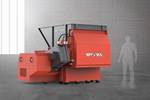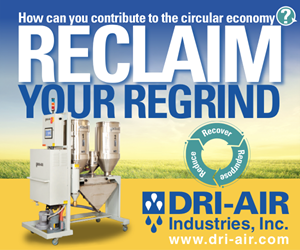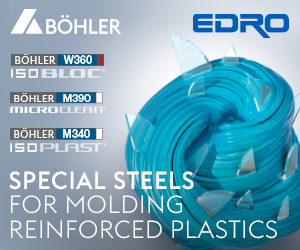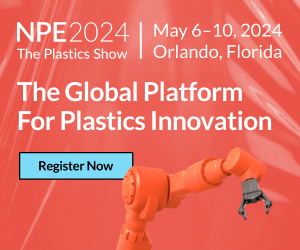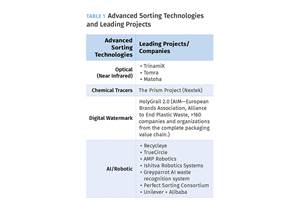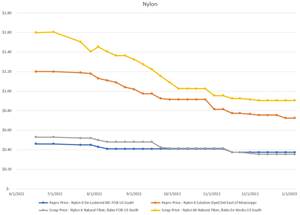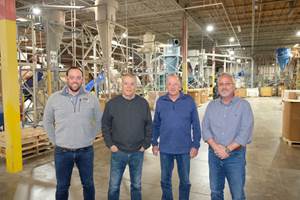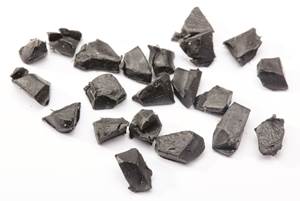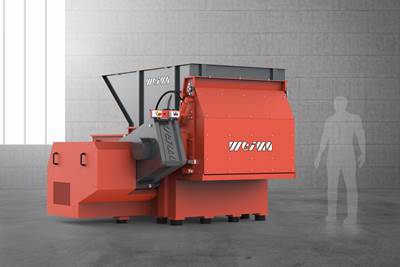Eastman to Use Reclaimed Polyester Carpet as Feedstock for Chemical Recycling
The reclaimed polyester carpet will be collected and processed by Circular Polymers, transported by railcar, and then upcycled by Eastman to produce new materials with certified recycled content.
Eastman Chemical has partnered with Circular Polymers, a company that reclaims post-consumer waste products for recycling, on recycling post-consumer carpet. Through this agreement, Eastman has secured a consistent source of feedstock for carbon renewal technology, a chemical recycling method that recently began commercial operation at Eastman's primary manufacturing site in Kingsport, Tenn.
Tim Dell, vice president of corporate innovation for Eastman, told Plastics Technology that for several months, the company has been conducting research and engaging with external parties on attractive sources of waste plastic feedstock for its chemical recycling technologies. He says that post-consumer carpet came to their attention pretty quickly, as more than 3 billion pounds are generated annually, with only a 5% recycling rate.
“This is a problematic material for our landfills since it is heavy and bulky, and is currently designed primarily for durability, not recycling,” he says. “Polyester is a growing fraction of the waste carpet stream, but end markets for the material primarily center around nylon.”
In addition, Eastman also learned that California has an ambitious recycling program in place to incentivize carpet reclamation, and that there have been significant advances in technologies in recent years that enable separation of the face fiber from the backing and weighting agent.
“After meeting the team at Circular Polymers, we were impressed with both their technology and entrepreneurial growth ambitions, and they were interested in us as a new outlet for reclaimed polyester fiber to help them continue to expand,” he says. “The timing was perfect as Eastman is both sourcing waste plastic today for our carbon renewal technology, and working to secure feedstocks for the startup of our advanced circular recycling (polyester methanolysis) process.”
“We anticipate that post-consumer carpet will be one of several waste product types that we will ultimately use as raw material for our processes. Our processes are robust and enable use of a wide range of plastic waste materials.”
Under this agreement, Circular Polymers will collect polyester carpet from homes and businesses and recycle it at the company's California reclamation facility, where they utilize a unique processing technology that efficiently separates the PET fiber from the carpeting. Circular Polymers densifies the fiber, which enables its efficient transport by railcar to Eastman's Tennessee manufacturing site for chemical recycling, where it will produce new materials with certified recycled content. Those materials will be used to produce products used in Eastman markets, including textiles, cosmetics and personal care and ophthalmics.
Recycling Initiatives
Earlier this year, Eastman announced two chemical recycling technologies: carbon renewal technology and advanced circular recycling.
The recycled carpet fiber will serve as an initial source of feedstock for Eastman’s carbon renewal technology (CRT). CRT can use mixed plastic waste and textiles as feedstock and convert it back to simple and versatile molecular components. The resulting molecules can be reintroduced to the production of a variety of materials, including products that serve ophthalmics, durables, packaging, textiles and nonwovens end-use markets. Dell says that carbon renewal technology is capable of recycling some of the most complex plastic waste streams, including non-polyester plastics and mixed plastics that cannot be recycled with conventional recycling technologies.
The other technology, advanced circular recycling, enables a circular solution for polyester waste. Through the process of methanolysis, polyester-based products – including polyester waste that cannot be recycled by current mechanical methods – are broken down to their monomers. These are then reintroduced as recycled raw materials to make high-quality polyesters suitable for use in a variety of end markets and deliver a true circular solution, he says.
Dell also points out that a third recycling stream technology leverages the existing municipal recycle stream to compound high quality post-consumer recycled content as feedstock with proprietary combinations of virgin copolyester. The resulting resin addresses a diverse set of needs, namely for the cosmetic industry, including color, processing, sustainability and mold thickness—all in a single pellet solution. Additionally, most of these products are compatible in the PET recycle stream, enabling brands to “close the loop” via an existing and familiar recycling infrastructure.
“These technologies have been proven at scale and can provide speed to market for our customers,” Dell says.
“The world needs a solution to the plastic waste problem, and we are confident we can be part of the solution. Our long history of technical expertise in chemical processes and polymer science positions us to provide innovative solutions to some of the world’s most complex problems, including the growing challenges of waste plastic in our environment,” he says. “We are also committed to working across the value chain to create real and actionable solutions towards a true circular economy. We believe that sustainable solutions to plastic waste are in reach and we are determined to play our part in the world’s collective response.”
Related Content
Recycling: What's Ahead in Advanced Sorting Technology
As the industry tries to ramp up recycling, there are several innovative sorting solutions in the offing—ranging from enhanced optical sorting technologies and chemical tracers to advanced solutions based digital watermarks and artificial intelligence.
Read MoreRecycled Material Prices Show Stability Heading into 2023
After summer's steep drop, most prices leveled off in the second half.
Read MoreEvolving Opportunities for Ambitious Plastics Recycler
St. Joseph Plastics grew from a simple grinding operation and now pursues growing markets in recycled PP, food-grade recycled materials, and customized post-industrial and post-consumer compounds.
Read MoreAvoid Four Common Traps In Granulation
Today, more than ever, granulation is an important step in the total production process. Our expert explains a few of the many common traps to avoid when thinking about granulators
Read MoreRead Next
For PLASTICS' CEO Seaholm, NPE to Shine Light on Sustainability Successes
With advocacy, communication and sustainability as three main pillars, Seaholm leads a trade association to NPE that ‘is more active today than we have ever been.’
Read MoreRecycling Partners Collaborate to Eliminate Production Scrap Waste at NPE2024
A collaboration between show organizer PLASTICS, recycler CPR and size reduction experts WEIMA and Conair will seek to recover and recycle 100% of the parts produced at the show.
Read More


